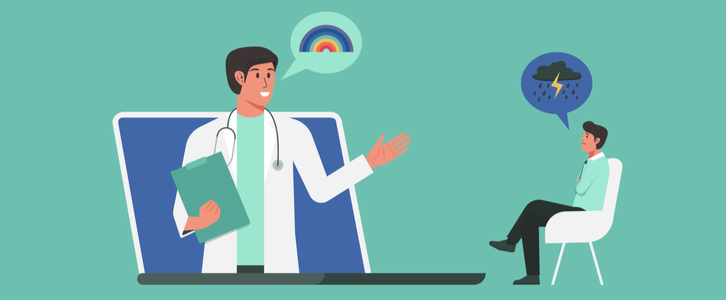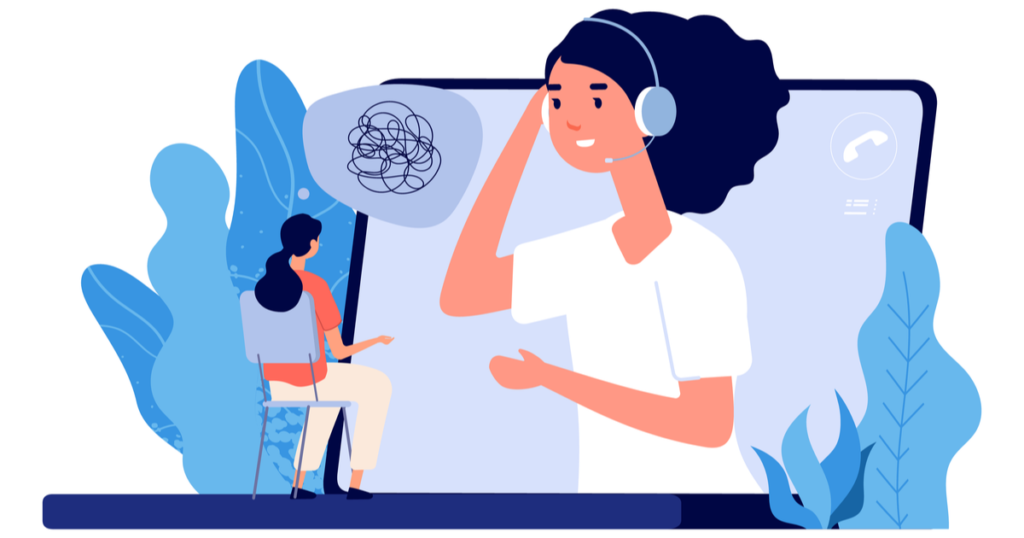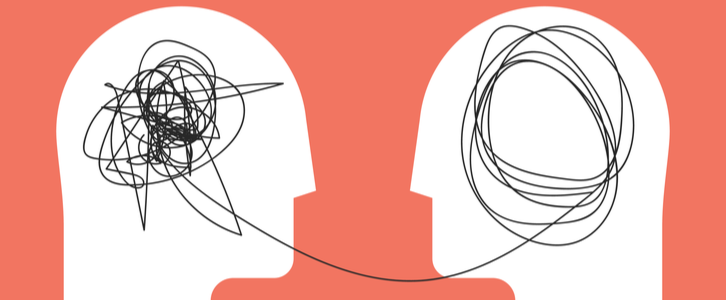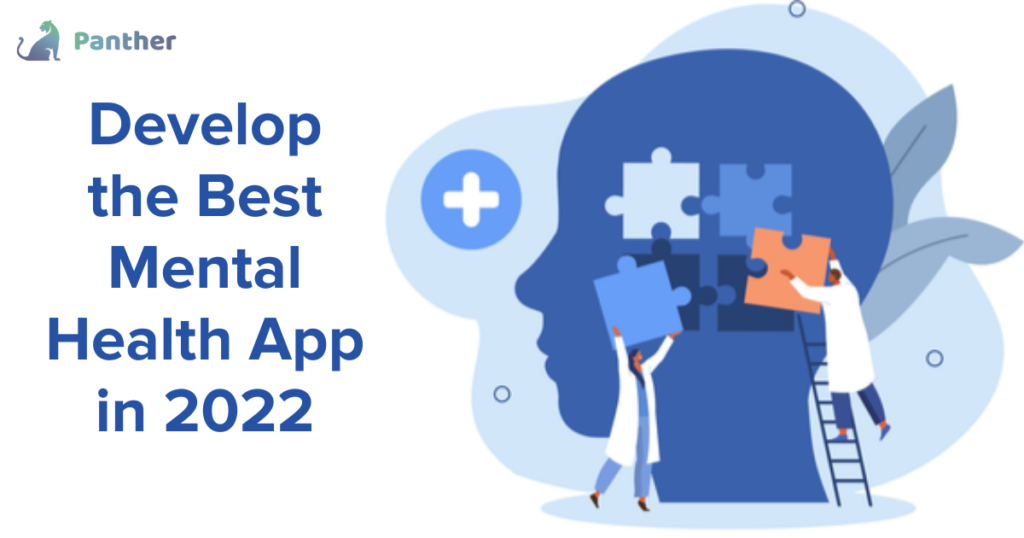
Let’s Understand the “Why” First
Before getting into the “how”, let’s first understand the “why” of building the best mental health app. Don’t you think it’s a bit opportunistic to say that you should build an app for people struggling with mental health? Well, all businesses are opportunistic in nature. However, the most impactful ones do more than just topline and bottom line. They touch people’s lives and in one way or the other improve the social fabric of our society.

It’s a sad reality that the modern world has mind-numbing statistics when it comes to people suffering from mental health issues, big or small. Recently, a blog published in World Bank presents a gory picture of how severe it is.
“Today, nearly 1 billion people live with a mental disorder and in low-income countries, more than 75% of people with the disorder do not receive treatment. Every year, close to 3 million people die due to substance abuse. Every 40 seconds, a person dies by suicide. About 50% of mental health disorders start by the age of 14.”
Now, I can imagine what you must be thinking. “Yes, yes it’s a worrisome thing and I get your point, but just like many other health issues, aren’t there medical consultants to help people out? Are you not blowing this out of proportion?
Are we?
The Stigma
Unlike many other health issues, talking about mental health is a taboo in our society, no matter how “progressive” or advanced it is. There are stereotypes that people with mental health issues are violent, dangerous, freaks, and what not. Media, over the period of time, has often portrayed them as unfit to lead “normal” lives. There is a long history of such discriminatory behavior towards people struggling with mental health problems, and that explains the inherent hesitation among its victims to come out and talk about it.
Okay, okay. I understood it’s a grave concern, but why build a mental health app? They could still go to doctors without telling anyone anything at all, right?
Well, not entirely true. You see, it’s one thing to sympathize with people and completely another to be one. This WHO article states
“Investment is required on all fronts: for mental health awareness to increase understanding and reduce stigma; for efforts to increase access to quality mental health care and effective treatments; and for research to identify new treatments and improve existing treatments for all mental disorders. In 2019, WHO launched the WHO Special Initiative for Mental Health (2019-2023): Universal Health Coverage for Mental Health to ensure access to quality and affordable care for mental health conditions in 12 priority countries to 100 million more people.”
To acknowledge that there is an issue, and to act on this, to do something about it, requires a hell lot of courage. And given how reclusive and “socially-distanced” our world has become recently (courtesy COVID-19), it is all the more difficult to identify the right avenues in order to address one’s mental health problems. However, recent developments (Yes, I’m referring to Covid), have also been a blessing-in-disguise of sorts.
Why Mental Health Consultants Need an Online Presence?

Many businesses have realized the importance of taking their practice online. Medical consultants, aka doctors too, have been able to diagnose their patients virtually without subjecting each other to unseen risks of going out. This is specially good for people suffering (or suspected of suffering) from mental health issues. They can comfortably choose the expert of their choice and, without having to confront them physically, seek the best help possible. This one single aspect of online consultation has dramatically instilled confidence (or at least the willingness) in people suffering from mental health problems to not just come out, but also get the issues resolved in the most effective way possible. In short, it’s-
- Accessible
- Affordable, and
- Convenient for both, the patient and the doctor.
How Big is the Opportunity?
Certain key factors such as, increase in aging population, fast-paced and stressful lifestyle and increased focus of governments all over the world on mental health issues are driving the mental health app industry. There are more than 300,000 health apps in the app stores all across the world, and mental health applications demonstrate the highest growth. According to an article published in MarketWatch, mental health apps industry will grow to USD 3.3Bn by 2027 with an annual average growth rate (CAGR) of 20.5%.
Also, this is not just one composite industry. It is further bifurcated into many sub categories (and hence separate app universe) depending upon the specific issues such as mental disorders, substance-abuse disorders, depression/anxiety, co-occuring disorders, and other peripheral mental issues.
While high revenue numbers and unprecedented growth have been observed everywhere, the exact numbers are closely linked with demography, penetration of internet services and support initiatives from the government. That said, the scope is immense across all geographies’ viz, North America, South America, Europe, Asia-Pacific and the rest of the world. Quite expectedly, the apps are readily available and downloaded from across all platforms/devices, viz. iOS and Android. The apps, then, come with weekly/monthly/yearly subscription or with one time payment (need based) business models.
Here are some recent headlines regarding mental health app industry
- First-time downloads of the top 20 mental wellbeing apps in the US grew by 30% from January to April in 2020
- Talkspace has recorded a 500% increase in requests from therapists to join the platform.
- BetterHelp recorded nearly 2x the number of users seeking help with stress and anxiety over the last year.
- US government has granted $5.5 billion for the Substance Abuse and Mental Health Services Administration (SAMHSA) in 2020.
- FDA has eased entry for counseling apps during the COVID-19 pandemic

What All Services Can You Provide Through Your Mental Health App?
The mental health app, as an industry, is quite diverse owing to the fact that people face different varieties of mental health issues. Just like our physical health, mental health can vary in its type, severity and urgency with which it needs to be addressed. While they could vary a lot in its type, here is a list of some of the most commonly observable mental health issues that people struggle with.
- Anxiety, Depression & Mood Control
- Behavioral and emotional disorders in children
- Bipolar affective disorder
- Eating Disorder
- Obsessive compulsive disorder
- Paranoia
- Psychosis
- Dissociation and dissociative disorders
- Post-traumatic stress disorders
- Schizophrenia
This is obviously not an exhaustive list, but it does give an idea about how varied the issues could be. As a result of this, many consultation marketplaces offer very specific services which have experts pertaining to particular practices only. While others provide one-stop solution to all sorts of mental health issues. Needless to say, once such platforms gain traction i.e. build trust among its users, which includes both the practitioners and the patients, they expand their catalogue of services to other health issues too.
Top Features to Include in a Great Mental Health App
For Doctors/Consultants
Scheduling Tool :
A scheduling tool becomes necessary for doctors. From where they can manage their workload and timetable conveniently. The feature should be integrated with a functional calendar which will manage appointments, leave notes, and so on.
Treatment Plans:
Every therapist and doctor have different charges for different treatments. So, this feature should allow the doctors to showcase their plans for the patients according to the various treatments offers.
Chat, Audio & Video Sessions with Patients
This is again a very crucial feature for both the doctor and the patient. Both should be able to talk to each other, be it via audio/video call or through normal chat. It will be also helpful to share files like lab results, documents etc., with each other within chats.
Furthermore, many healthcare apps use a chatbot that asks users about their symptoms and concerns, so doctors can understand the problem from the beginning.
Analytics:
It’s also important to provide specialists with different metrics to manage, track, and optimize various aspects of their counselling practice.
It can include:
- Daily/weekly/monthly number of patients.
- Total number of patients.
- New patients (requests).
- Total revenue
- Revenue from each patient.
- Satisfaction rate & reviews etc.
For Patients
User Profile
The basic of any healthcare app allows users to create their own user profiles. It makes the process convenient for both the patient and the doctor. The point is to create your mental health app structure and design seamless.
Sign-up and Sign-in
The entire process should be short and easy. Our attention span is too short, and we usually get frustrated when we have to fill a long and tedious form. And if a common individual with no health issues can get irritated, then people who are suffering with any kind of mental health issues would get frustrated with too many steps. So the entire sign-up and sign-in process should make their life easier.
Meditations & Mental Activities
Meditation feature may help patients understand their feelings better, understand the true reasons why they appear, and have a more aware lifestyle. Furthermore, it will engage them with your app in a more personal level. The idea is to get the patients to feel secure and connected with your app.
Apart from meditations, there are a bunch of different activities that can be added in your mental health app:
- Breathing exercises.
- Stretching & yoga
- Sleep & lifestyle etc.
Chat, Audio & Video-calls
It is quite obvious that if the doctor has a chat, audio and video feature, the patient’s interface should also have the same. This is very important for mental health apps. A patient must be able to chat, call, or video call with the consultant from within the application.
Emergency Feature
This is one of the most important features to include in your mental health app. Patients with mental health issues can get anxiety attacks, panic attacks, and other such problems that require immediate solution. The app should provide them an option to send emergency messages to their doctor and caregivers with one click.
Push-Notifications:
This feature is useful to remind patients about their activities, daily tasks, journaling, and so on. Moreover, it can also work as a confidence booster by sending motivational and encouraging notifications to remind people how strong and capable they are. So, you can help one realize what they are capable of with the help of such push notifications. Even though the end goal of the mental health app is to help people, we must not forget about the business part. Push notifications can be used to offer personalized offers, which eventually will help you to increase sales.
Conclusion
A successful idea not only requires merit, but right time and right partnerships too. Indeed, this is one of the most opportune times to build a mental health consultation app. Moreover, to build something that not only does good business, but also improve people’s lives is nothing short of public service.
A mental health app, in that sense, brings accessibility, affordability and convenience to those seeking professional help to deal with their mental health issues without having to go through the societal pressure of opening up in front of everyone. In addition, it also helps professionals to be available for the people who are seeking help and not comfortable for a face to face consultation. The mental healthcare industry is moving towards digitalization to start providing services remotely, and nobody wants to lag behind when it comes to running a successful business.

If you’re thinking of making your own mental health app or growing your current mental health consultation business, Panther is a go-to platform for you. No coding required & launch within a day! And to get started, you don’t need to invest in a large customer support team. Panther offers a robust chatbot feature that doesn’t just help patients with basic queries, but does a lot more.
Curious about how Panther can help you take your online mental health consultation practice to the heights of success? Get in touch with our experts straightway. We’d be glad to help you on this journey towards success.
If you enjoyed reading this, we’re sure you will also love to check out what we have in store in our resources.
If you need any help with the development or have questions left, feel free to reach out to us. We’d be happy to help you on your journey to improving people’s mental state!
Subscribe to stay ahead with the latest updates and entrepreneurial insights!

Subscribe to our newsletter
Get access to the latest industry & product insights.





















